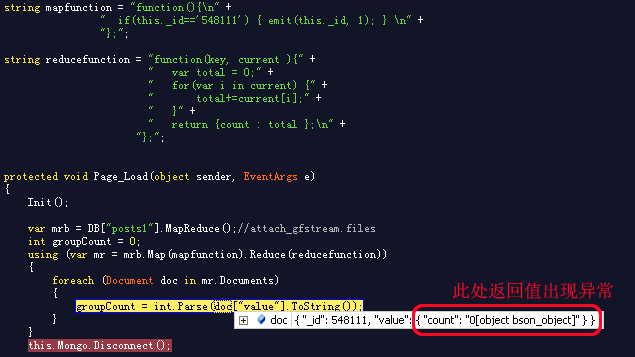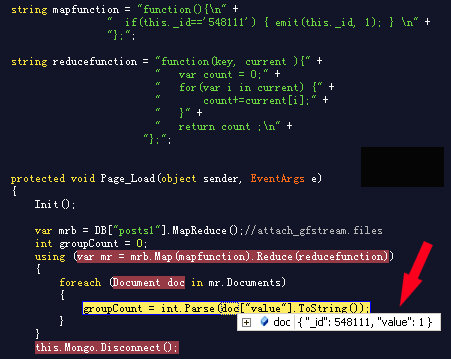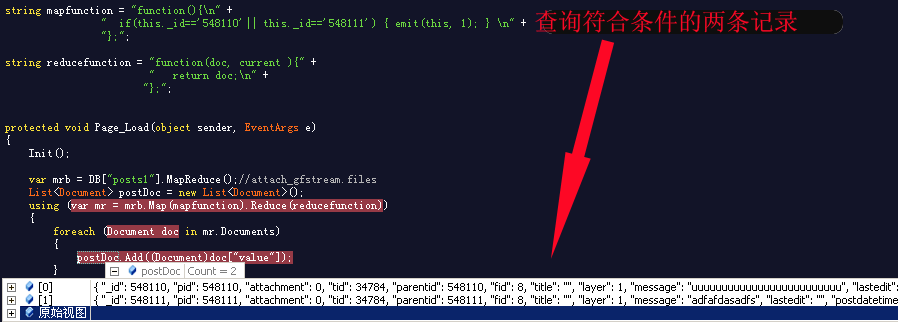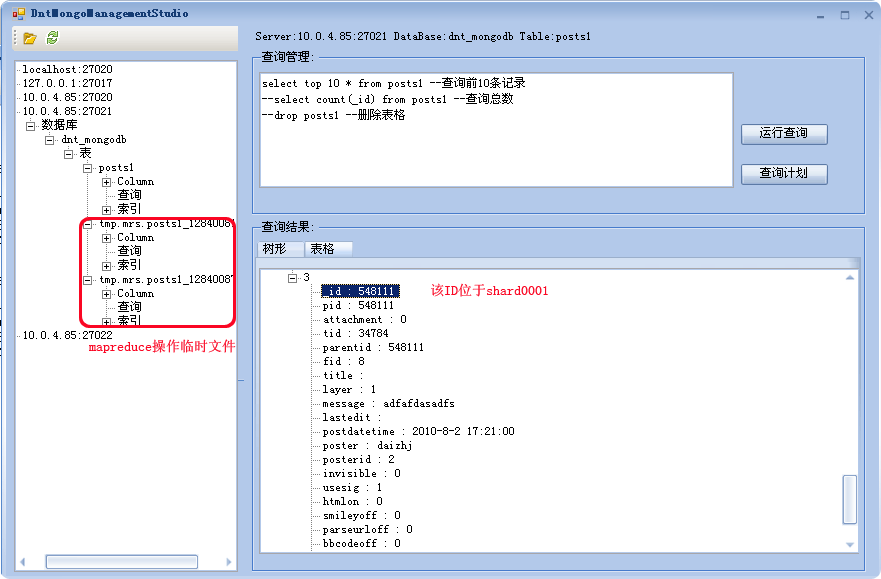基于MongoDB分布式存储进行MapReduce并行查询
2010-09-13 12:40
316 查看
之前的文章中介绍了如何基于Mongodb进行关系型数据的分布式存储,有了存储就会牵扯到查询。虽然用普通的方式也可以进行查询,但今天要介绍的是如何使用MONGODB中提供的MapReduce功能进行查询。
有关MongoDb的MapReduce之前我写过一篇文章 Mongodb Mapreduce 初窥,
今天介绍如何基于sharding机制进行mapreduce查询。在MongoDB的官方文档中,这么一句话:
Sharded Environments
In sharded environments, data processing of map/reduce operations runs in parallel on all shards.
即: map/reduce操作会并行运行在所有的shards上。
下面我们就用之前这篇文章中白搭建的环境来构造mapreduce查询:
首先要说的是,基于sharding的mapreduce与非sharding的数据在返回结构上有一些区别,我目前注意到的主要是不支持定制式的json格式的返回数据,也就是下面方式可能会出现问题:
return { count : total };
注意:上面的情况目前出现在了我的测试环境下,如下图:

就需要改成 return count;
下面是测试代码,首先是按帖子id来查询相应数量(基于分组查询实例方式):


public partial class getfile : System.Web.UI.Page
{
public Mongo Mongo { get; set; }
public IMongoDatabase DB
{
get
{
return this.Mongo["dnt_mongodb"];
}
}
/// <summary>
/// Sets up the test environment. You can either override this OnInit to add custom initialization.
/// </summary>
public virtual void Init()
{
string ConnectionString = "Server=10.0.4.85:27017;ConnectTimeout=30000;ConnectionLifetime=300000;MinimumPoolSize=512;MaximumPoolSize=51200;Pooled=true";
if (String.IsNullOrEmpty(ConnectionString))
throw new ArgumentNullException("Connection string not found.");
this.Mongo = new Mongo(ConnectionString);
this.Mongo.Connect();
}
string mapfunction = "function(){/n" +
" if(this._id=='548111') { emit(this._id, 1); } /n" +
"};";
string reducefunction = "function(key, current ){" +
" var count = 0;" +
" for(var i in current) {" +
" count+=current[i];" +
" }" +
" return count ;/n" +
"};";
protected void Page_Load(object sender, EventArgs e)
{
Init();
var mrb = DB["posts1"].MapReduce();//attach_gfstream.files
int groupCount = 0;
using (var mr = mrb.Map(mapfunction).Reduce(reducefunction))
{
foreach (Document doc in mr.Documents)
{
groupCount = int.Parse(doc["value"].ToString());
}
}
this.Mongo.Disconnect();
}
}
下面是运行时的查询结果,如下:

接着演示一下如何把查询到的帖子信息返回并装入list集合,这里只查询ID为548110和548111两个帖子:


string mapfunction = "function(){/n" +
" if(this._id=='548110'|| this._id=='548111') { emit(this, 1); } /n" +
"};";
string reducefunction = "function(doc, current ){" +
" return doc;/n" +
"};";
protected void Page_Load(object sender, EventArgs e)
{
Init();
var mrb = DB["posts1"].MapReduce();//attach_gfstream.files
List<Document> postDoc = new List<Document>();
using (var mr = mrb.Map(mapfunction).Reduce(reducefunction))
{
foreach (Document doc in mr.Documents)
{
postDoc.Add((Document)doc["value"]);
}
}
this.Mongo.Disconnect();
}
下面是运行时的查询结果,如下:

上面的map/reduce方法还有许多写法,如果大家感兴趣可以看一下如下这些链接:
http://cookbook.mongodb.org/patterns/unique_items_map_reduce/
http://www.mongodb.org/display/DOCS/MapReduce
以及之前我写的这篇文章:http://www.cnblogs.com/daizhj/archive/2010/06/10/1755761.html
当然在mongos进行map/reduce运算时,会生成一些临时文件,如下图:

我猜这些临时文件可能会对再次查询系统时的性能有一些提升(但目前未观察到)。
当然对于mongodb的gridfs系统(可使用它搭建分布式文件存储系统,我之前在这篇文章中已介绍过,我也做了测试,但遗憾的是并未成功,它经常会报一些错误,比如:
Thu Sep 09 12:09:29 Assertion failure _grab client/parallel.cpp 461
看来mapreduce程序链接到mongodb上时,会产生一些问题,但不知道是不是其自身稳定性的原因,还是我的机器环境设置问题(内存或配置的64位系统mongos与32位的client连接问题)。
好了,今天的文章就先到这里了。
原文链接:http://www.cnblogs.com/daizhj/archive/2010/09/09/1822264.html
BLOG: http://daizhj.cnblogs.com/
作者:daizhj,代震军
有关MongoDb的MapReduce之前我写过一篇文章 Mongodb Mapreduce 初窥,
今天介绍如何基于sharding机制进行mapreduce查询。在MongoDB的官方文档中,这么一句话:
Sharded Environments
In sharded environments, data processing of map/reduce operations runs in parallel on all shards.
即: map/reduce操作会并行运行在所有的shards上。
下面我们就用之前这篇文章中白搭建的环境来构造mapreduce查询:
首先要说的是,基于sharding的mapreduce与非sharding的数据在返回结构上有一些区别,我目前注意到的主要是不支持定制式的json格式的返回数据,也就是下面方式可能会出现问题:
return { count : total };
注意:上面的情况目前出现在了我的测试环境下,如下图:

就需要改成 return count;
下面是测试代码,首先是按帖子id来查询相应数量(基于分组查询实例方式):


public partial class getfile : System.Web.UI.Page
{
public Mongo Mongo { get; set; }
public IMongoDatabase DB
{
get
{
return this.Mongo["dnt_mongodb"];
}
}
/// <summary>
/// Sets up the test environment. You can either override this OnInit to add custom initialization.
/// </summary>
public virtual void Init()
{
string ConnectionString = "Server=10.0.4.85:27017;ConnectTimeout=30000;ConnectionLifetime=300000;MinimumPoolSize=512;MaximumPoolSize=51200;Pooled=true";
if (String.IsNullOrEmpty(ConnectionString))
throw new ArgumentNullException("Connection string not found.");
this.Mongo = new Mongo(ConnectionString);
this.Mongo.Connect();
}
string mapfunction = "function(){/n" +
" if(this._id=='548111') { emit(this._id, 1); } /n" +
"};";
string reducefunction = "function(key, current ){" +
" var count = 0;" +
" for(var i in current) {" +
" count+=current[i];" +
" }" +
" return count ;/n" +
"};";
protected void Page_Load(object sender, EventArgs e)
{
Init();
var mrb = DB["posts1"].MapReduce();//attach_gfstream.files
int groupCount = 0;
using (var mr = mrb.Map(mapfunction).Reduce(reducefunction))
{
foreach (Document doc in mr.Documents)
{
groupCount = int.Parse(doc["value"].ToString());
}
}
this.Mongo.Disconnect();
}
}
下面是运行时的查询结果,如下:

接着演示一下如何把查询到的帖子信息返回并装入list集合,这里只查询ID为548110和548111两个帖子:


string mapfunction = "function(){/n" +
" if(this._id=='548110'|| this._id=='548111') { emit(this, 1); } /n" +
"};";
string reducefunction = "function(doc, current ){" +
" return doc;/n" +
"};";
protected void Page_Load(object sender, EventArgs e)
{
Init();
var mrb = DB["posts1"].MapReduce();//attach_gfstream.files
List<Document> postDoc = new List<Document>();
using (var mr = mrb.Map(mapfunction).Reduce(reducefunction))
{
foreach (Document doc in mr.Documents)
{
postDoc.Add((Document)doc["value"]);
}
}
this.Mongo.Disconnect();
}
下面是运行时的查询结果,如下:

上面的map/reduce方法还有许多写法,如果大家感兴趣可以看一下如下这些链接:
http://cookbook.mongodb.org/patterns/unique_items_map_reduce/
http://www.mongodb.org/display/DOCS/MapReduce
以及之前我写的这篇文章:http://www.cnblogs.com/daizhj/archive/2010/06/10/1755761.html
当然在mongos进行map/reduce运算时,会生成一些临时文件,如下图:

我猜这些临时文件可能会对再次查询系统时的性能有一些提升(但目前未观察到)。
当然对于mongodb的gridfs系统(可使用它搭建分布式文件存储系统,我之前在这篇文章中已介绍过,我也做了测试,但遗憾的是并未成功,它经常会报一些错误,比如:
Thu Sep 09 12:09:29 Assertion failure _grab client/parallel.cpp 461
看来mapreduce程序链接到mongodb上时,会产生一些问题,但不知道是不是其自身稳定性的原因,还是我的机器环境设置问题(内存或配置的64位系统mongos与32位的client连接问题)。
好了,今天的文章就先到这里了。
原文链接:http://www.cnblogs.com/daizhj/archive/2010/09/09/1822264.html
BLOG: http://daizhj.cnblogs.com/
作者:daizhj,代震军
相关文章推荐
- 基于MongoDB分布式存储进行MapReduce并行查询
- 基于MongoDB分布式存储进行MapReduce并行查询
- 五种基于 MapReduce 的并行计算框架介绍及性能测试
- 基于SearchControl控件对节点进行查询的操作
- Hadoop第7周练习—MapReduce进行数据查询和实现推简单荐系统(转)
- 基于boost和otlv4连接oracle进行简单查询笔记
- Hadoop第7周练习—MapReduce进行数据查询和实现推简单荐系统
- OS X上基于OpenMP进行并行程序开发
- [Qt] 运用QtConcurrent中的MapReduce模型进行简单的C++并行运算
- Hadoop—MapReduce进行数据查询和实现推简单荐系统---练习7
- 利用hadoop mapreduce进行 并行计算
- 关于hive查询与MapReduce并行计算
- 基于MongoDB分布式存储进行MapReduce并行查询
- OpenRS—— 开放式遥感数据处理与服务平台 OpenRS-Cloude:基于MapReduce的并行遥感处理系统
- OpenRS—— 开放式遥感数据处理与服务平台 OpenRS-Cloude:基于MapReduce的并行遥感处理系统
- 基于MapReduce的TOP-K查询问题的实现
- WebGIS中基于控制点库进行SHP数据坐标转换的一种查询优化策略
- 使用mapreduce并行化基于物品的协同过滤算法
- OS X上基于OpenMP进行并行程序开发
- 基于Hadoop+Hive架构对海量数据进行查询
